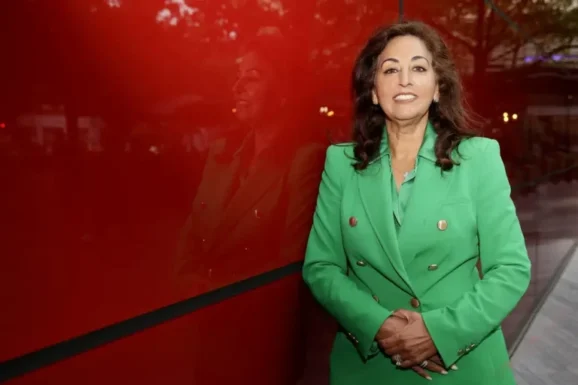Busting the ‘Mum Guilt’ Myth: How Ambitious Women CAN Thrive at Home and at Work

John E. Kaye
- Published
- Home, Opinion & Analysis

With children as well as a career, working mothers might seem to have it all. But the ‘double guilt’ of having a job and having a family is a debilitating burden that many ambitious mums struggle to ever overcome. As the Festival of Lights approaches, now is the time for women everywhere to clear their conscience and step out of the shadows, writes executive coach Rita Chowdhry
Earlier this year, The One Show host Alex Jones admitted juggling TV and family commitments made her feel “guilty”. Being unable to put the kids to bed every night “breaks my heart”, the Welsh presenter told Women and Home UK.
Jones, 47, is not alone. According to a 2024 study of 2,000 women, as many as three quarters of mothers worry if they’re a good mum, with the guilt of going back to work after maternity affecting many.
Dina, a longstanding client of mine, is one of them. She reached out to me during a pivotal moment in her life. Dina described herself as – and clearly was – a devoted mother, with her identity deeply tied to being the best parent she could be. However, she was weighed down by the same ‘mum guilt’ that Jones and others have experienced. The guilt began to affect her professional and home life; she was trying to be everything to everyone, but in the process was neglecting herself.
On the face of it, Dina had everything – a good job and a happy, healthy family. It meant she couldn’t easily pinpoint what was missing in her life or why she felt so stuck. Although she had recently been promoted to the senior leadership team—where she was not only the youngest but one of only two women—she struggled with confidence in her own voice. And she often found herself making excuses to avoid further advancement, unsure of her potential – the telltale signs of imposter syndrome. But what made matters worse was the guilt she felt at the thought of dedicating more time to her career, fearing it would come at the expense of her children.
In our first session, we began with a deep self-awareness exercise, which allowed Dina to explore her core values, beliefs, and untapped strengths. It was difficult at first, but slowly she started to confront the challenges she had long avoided and came to a powerful realisation: while she had been a pillar of support to her family, she had completely neglected her own growth.
Her breakthrough came when she discovered her “why” – the sense of innate purpose that drove her forward. Once she had done so, Dina used her achiever’s mindset to push forward and unburden the guilt that she had been carrying for so long. Rather than fearing change, she began to see it as a path to growth.
As we continued our work, Dina learned to harness her strengths and set bold, ambitious goals. Each challenge shifted her mindset from fearing failure to seeing possibilities. In the months that followed, her growth was remarkable. She was promoted three times, completed her Level 6 Chartered Institute of Marketing certification, became a trustee of a food bank, and evolved into a sought-after panel speaker. Most importantly, she achieved this without sacrificing her relationship with her children or feeling guilty about her development. She found the balance she had been seeking. Her children now saw her as a role model and fully supported her transformative journey.
Looking back on her progress, I am still amazed at transformation. She went from a woman hesitant to use her voice and overwhelmed with mum guilt to a recognised leader and keynote speaker.
Dina’s accomplishments serve as a reminder of what it means to rediscover your light and where it takes you. And as Diwali approaches, there is no better time to find our own “whys” and for us to step out of the shadows. The Festival of Lights is about the triumph of light over darkness and about good over evil. But it is also about new beginnings and transformation, and about overcoming obstacles in much the same way as Lord Rama did after defeating the demon king, Ravana.

Rita Chowdhry is a globally recognised corporate coach and advanced DISC trainer. After transitioning from a teaching career, she founded Savran, an award-winning coaching and consulting company that works with individuals and corporates to enhance performance. Since then, she has received numerous accolades, including Small Business of the Year (2016), Best Woman in Business (2017), and Global Woman of the Year (2024).
Main image: Courtesy Yan Krukau/Pexels
RECENT ARTICLES
-
 The era of easy markets is ending — here are the risks investors can no longer ignore
The era of easy markets is ending — here are the risks investors can no longer ignore -
 Is testosterone the new performance hack for executives?
Is testosterone the new performance hack for executives? -
 Can we regulate reality? AI, sovereignty and the battle over what counts as real
Can we regulate reality? AI, sovereignty and the battle over what counts as real -
 NATO gears up for conflict as transatlantic strains grow
NATO gears up for conflict as transatlantic strains grow -
 Facial recognition is leaving the US border — and we should be concerned
Facial recognition is leaving the US border — and we should be concerned -
 Wheelchair design is stuck in the past — and disabled people are paying the price
Wheelchair design is stuck in the past — and disabled people are paying the price -
 Why Europe still needs America
Why Europe still needs America -
 Why Europe’s finance apps must start borrowing from each other’s playbooks
Why Europe’s finance apps must start borrowing from each other’s playbooks -
 Why universities must set clear rules for AI use before trust in academia erodes
Why universities must set clear rules for AI use before trust in academia erodes -
 The lucky leader: six lessons on why fortune favours some and fails others
The lucky leader: six lessons on why fortune favours some and fails others -
 Reckon AI has cracked thinking? Think again
Reckon AI has cracked thinking? Think again -
 The new 10 year National Cancer Plan: fewer measures, more heart?
The new 10 year National Cancer Plan: fewer measures, more heart? -
 The Reese Witherspoon effect: how celebrity book clubs are rewriting the rules of publishing
The Reese Witherspoon effect: how celebrity book clubs are rewriting the rules of publishing -
 The legality of tax planning in an age of moral outrage
The legality of tax planning in an age of moral outrage -
 The limits of good intentions in public policy
The limits of good intentions in public policy -
 Are favouritism and fear holding back Germany’s rearmament?
Are favouritism and fear holding back Germany’s rearmament? -
 What bestseller lists really tell us — and why they shouldn’t be the only measure of a book’s worth
What bestseller lists really tell us — and why they shouldn’t be the only measure of a book’s worth -
 Why mere survival is no longer enough for children with brain tumours
Why mere survival is no longer enough for children with brain tumours -
 What Germany’s Energiewende teaches Europe about power, risk and reality
What Germany’s Energiewende teaches Europe about power, risk and reality -
 What the Monroe Doctrine actually said — and why Trump is invoking it now
What the Monroe Doctrine actually said — and why Trump is invoking it now -
 Love with responsibility: rethinking supply chains this Valentine’s Day
Love with responsibility: rethinking supply chains this Valentine’s Day -
 Why the India–EU trade deal matters far beyond diplomacy
Why the India–EU trade deal matters far beyond diplomacy -
 Why the countryside is far safer than we think - and why apex predators belong in it
Why the countryside is far safer than we think - and why apex predators belong in it -
 What if he falls?
What if he falls? -
 Trump reminds Davos that talk still runs the world
Trump reminds Davos that talk still runs the world


























